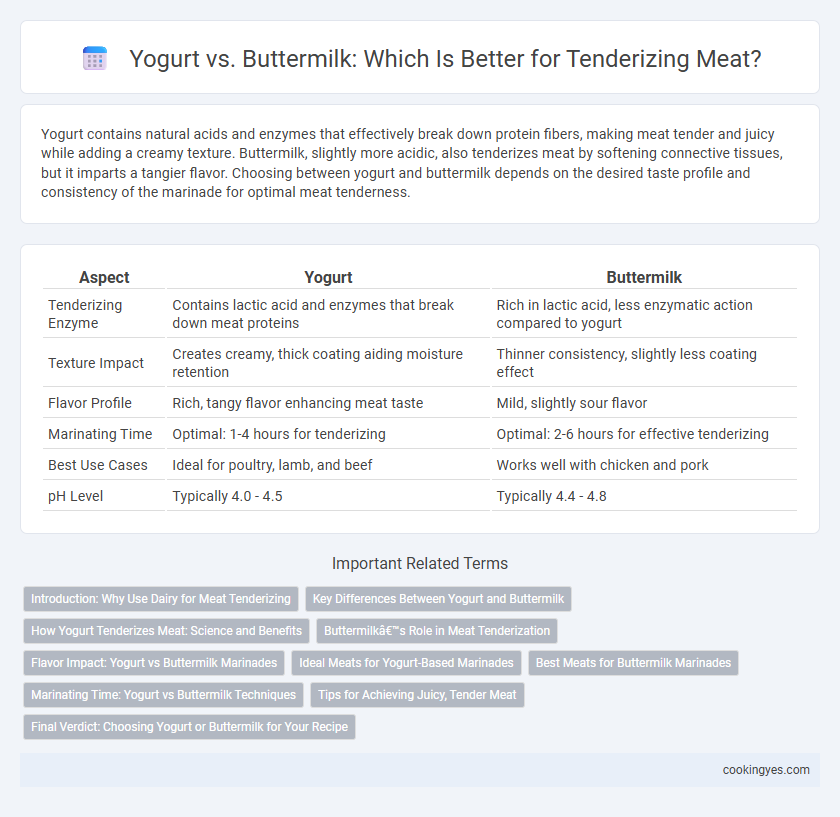Yogurt contains natural acids and enzymes that effectively break down protein fibers, making meat tender and juicy while adding a creamy texture. Buttermilk, slightly more acidic, also tenderizes meat by softening connective tissues, but it imparts a tangier flavor. Choosing between yogurt and buttermilk depends on the desired taste profile and consistency of the marinade for optimal meat tenderness.
Table of Comparison
| Aspect | Yogurt | Buttermilk |
|---|---|---|
| Tenderizing Enzyme | Contains lactic acid and enzymes that break down meat proteins | Rich in lactic acid, less enzymatic action compared to yogurt |
| Texture Impact | Creates creamy, thick coating aiding moisture retention | Thinner consistency, slightly less coating effect |
| Flavor Profile | Rich, tangy flavor enhancing meat taste | Mild, slightly sour flavor |
| Marinating Time | Optimal: 1-4 hours for tenderizing | Optimal: 2-6 hours for effective tenderizing |
| Best Use Cases | Ideal for poultry, lamb, and beef | Works well with chicken and pork |
| pH Level | Typically 4.0 - 4.5 | Typically 4.4 - 4.8 |
Introduction: Why Use Dairy for Meat Tenderizing
Dairy products like yogurt and buttermilk contain lactic acid and enzymes that break down muscle fibers, making meat more tender. The acidic nature of these dairy marinades enhances meat texture by softening connective tissues without overpowering the flavor. Using yogurt or buttermilk also adds moisture, resulting in juicier, more flavorful cooked meat.
Key Differences Between Yogurt and Buttermilk
Yogurt contains higher protein content and thicker consistency compared to buttermilk, which makes it more effective in coating meat and retaining moisture during marination. Buttermilk has a lower fat content and contains lactic acid that tenderizes meat gently, suitable for prolonged marinating times without breaking down fibers excessively. The unique bacterial cultures in yogurt promote a richer flavor and creamier texture, while buttermilk imparts a tangier taste and lighter texture, influencing the final dish's tenderness and flavor profile.
How Yogurt Tenderizes Meat: Science and Benefits
Yogurt contains lactic acid and natural enzymes that break down muscle proteins, effectively tenderizing meat by softening its fibers and enhancing juiciness. The probiotics and calcium in yogurt also aid in maintaining meat's moisture while adding a subtle tangy flavor to improve taste. Using yogurt as a marinade not only tenderizes tougher cuts but also promotes a more succulent and flavorful result compared to buttermilk.
Buttermilk’s Role in Meat Tenderization
Buttermilk contains lactic acid and enzymes that break down muscle fibers and connective tissues, resulting in more tender meat. Its slightly acidic nature helps to denature proteins without making the meat mushy, enhancing juiciness and flavor absorption. Compared to yogurt, buttermilk's thinner consistency allows for a more even coating and deeper marinade penetration.
Flavor Impact: Yogurt vs Buttermilk Marinades
Yogurt marinades impart a creamy, slightly tangy flavor with natural sweetness that tenderizes meat while enhancing its richness. Buttermilk marinades offer a sharper, more acidic profile that breaks down proteins effectively and adds a subtle tanginess without overpowering the meat's natural taste. Using yogurt results in a milder, smoother flavor, whereas buttermilk creates a brighter, tangier finish in marinated dishes.
Ideal Meats for Yogurt-Based Marinades
Yogurt-based marinades are ideal for tenderizing lamb, chicken, and beef due to their natural enzymes and lactic acid, which break down tough muscle fibers without making the meat mushy. The high protein content in yogurt helps retain moisture, enhancing juiciness while imparting a subtle tangy flavor. Unlike buttermilk, yogurt's thicker consistency allows for a better coating, ensuring even marination and deeper flavor penetration.
Best Meats for Buttermilk Marinades
Buttermilk is ideal for tenderizing tougher cuts of beef like brisket, chuck, and short ribs due to its high lactic acid content that breaks down protein fibers effectively. It also works well with poultry such as chicken thighs and drumsticks, enhancing moisture retention and tenderness. Using buttermilk for pork shoulder or country-style ribs results in juicier, more flavorful meat compared to yogurt, which is better suited for lighter proteins.
Marinating Time: Yogurt vs Buttermilk Techniques
Yogurt's lactic acid and enzymes penetrate meat fibers more deeply, often requiring a shorter marinating time of 1 to 3 hours for effective tenderizing. Buttermilk, with a milder acidity and similar enzymatic activity, typically needs a longer marination period of 4 to 6 hours to achieve comparable tenderness. Both dairy-based marinades improve meat texture, but yogurt's thicker consistency enhances adhesion, allowing more efficient acid contact during shorter marinating intervals.
Tips for Achieving Juicy, Tender Meat
Yogurt and buttermilk both contain lactic acid and enzymes that break down proteins, making them effective tenderizers for meat. For juicy, tender results, marinate meat for at least 4 hours in yogurt or buttermilk, ensuring even coating to penetrate deeply. Use full-fat versions to retain moisture and combine with spices like garlic and turmeric to enhance flavor and texture.
Final Verdict: Choosing Yogurt or Buttermilk for Your Recipe
Yogurt's thicker consistency and higher protein content make it ideal for tenderizing tougher cuts of meat while adding a rich, creamy texture to dishes. Buttermilk, with its lower fat content and mild acidity, penetrates meats quickly, making it perfect for lighter, more delicate proteins like chicken. Opt for yogurt when a thicker marinade and pronounced flavor are desired, and choose buttermilk for a lighter, subtler tenderizing effect in your recipes.
Yogurt vs Buttermilk for Tenderizing Meat Infographic

 cookingyes.com
cookingyes.com